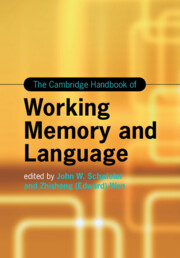Book contents
- The Cambridge Handbook of Working Memory and Language
- Cambridge Handbooks in Language and Linguistics
- The Cambridge Handbook of Working Memory and Language
- Copyright page
- Contents
- Figures
- Tables
- About the Editors
- About the Contributors
- Acknowledgments
- Overview of the Handbook
- Part I Introduction
- Part II Models and Measures
- Part III Linguistic Theories and Frameworks
- Part IV First Language Processing
- 19 Working Memory in Word Reading
- 20 The Role of Working Memory in Language Comprehension and Production
- 21 Working Memory and High-Level Text Comprehension Processes
- 22 Working Memory and Speech Planning
- 23 How Do Novice and Skilled Writers Engage Working Memory?
- Part V Bilingual Acquisition and Processing
- Part VI Language Disorders, Interventions, and Instruction
- Part VII Conclusion
- Index
- References
22 - Working Memory and Speech Planning
from Part IV - First Language Processing
Published online by Cambridge University Press: 08 July 2022
- The Cambridge Handbook of Working Memory and Language
- Cambridge Handbooks in Language and Linguistics
- The Cambridge Handbook of Working Memory and Language
- Copyright page
- Contents
- Figures
- Tables
- About the Editors
- About the Contributors
- Acknowledgments
- Overview of the Handbook
- Part I Introduction
- Part II Models and Measures
- Part III Linguistic Theories and Frameworks
- Part IV First Language Processing
- 19 Working Memory in Word Reading
- 20 The Role of Working Memory in Language Comprehension and Production
- 21 Working Memory and High-Level Text Comprehension Processes
- 22 Working Memory and Speech Planning
- 23 How Do Novice and Skilled Writers Engage Working Memory?
- Part V Bilingual Acquisition and Processing
- Part VI Language Disorders, Interventions, and Instruction
- Part VII Conclusion
- Index
- References
Summary
A distinguishing feature of the cognitive process of speech planning is its flexible balancing of speed, quality, and effort. Utterance planning strategies can vary adaptively depending on speaker goals and circumstances. For example, when speed is a priority, the planning process might sacrifice the quality of an utterance by engaging in more incremental, on-the-fly planning. A focus on utterance quality may require more time. But sometimes, speakers seem to plan utterances well in advance without sacrificing quality or speed. In this chapter, we focus on recent research that explores how working memory can foster the flexibility of speech planning strategies. We review the role that WM might play in individual levels of planning, including message planning, grammatical encoding (including lemma selection and structure building), and phonological encoding, and the extent to which the scope and quality of planning at these different levels could be subject to WM constraints or predicted by WM capacity. We conclude that WM is a (sometimes optionally invoked) part of a complex system of compensatory factors that can determine how speech planning unfolds.
- Type
- Chapter
- Information
- The Cambridge Handbook of Working Memory and Language , pp. 482 - 503Publisher: Cambridge University PressPrint publication year: 2022
References
- 1
- Cited by

